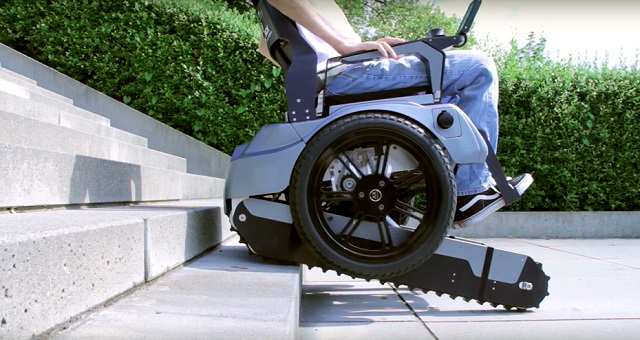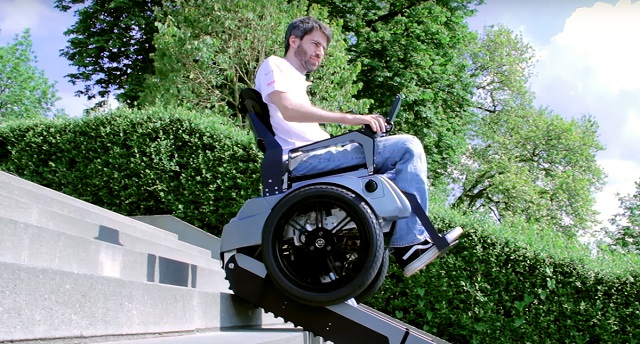Stairs and wheelchairs don’t go well together, and since many architects forget to add ramps to the buildings they design, 10 students from Swiss Federal Institute of Technology (ETH Zurich) and the Zurich University of the Arts are looking to circumvent the problem.
The Scalevo Wheelchair, as the 10 students named their creation, doesn’t look much different from a typical (albeit very modern) wheelchair. On flat ground, it employs two Segway-like wheels, but magic starts happening when users needing to climb stairs push a button that summons two rubber tracks. The concept is not revolutionary, as it has been seen before even in stair-climbing robots. However, it’s great to see a fresh take on it.

“We have two main wheels, two large wheels to drive around on the flat ground in a balancing mode like a Segway. And then we have two rubber tracks which we can extend to the angle of the stairs and let the wheelchair be always upright on every angle on the stairs,” pointed out Carlos Gomes, of ETH Zurich.

“Tracks are excellent for this use case because they have a very large footprint, which makes it near impossible to tilt, and they are also very smooth so it doesn’t feel like you’re driving up stairs, so it just feels like you’re driving up a ramp because they’re so flat and they adapt to the stair profile. So it doesn’t matter if the stair is wooden or metal or glass, the tracks they grip and there’s no danger of slipping,” added Miro Voellmy.

“The great thing is that everything on this wheelchair is automated. […] If I want to climb the stairs I can just drive up to them, turn around, press one button and all I have to do is control the velocity I want to drive at. The alignment on the stairs, the leveling of the wheelchair driver, is automated and he can control it, he can view the back with a back facing camera, and have a full, safe, driving experience. […] It was built very compact, so it’s not much wider than a classic manual wheelchair and it can still go under tables, you can go through narrow doors and use it indoors without any hassle, so it’s extremely compact in comparison to different wheelchairs and it’s very easy to use.”
Gomes explained that the wheelchair has been tested thoroughly: “We tested the wheelchair on several staircases, even on a spiral staircase, because we can move the tracks independently and all kinds of staircases we are able to drive (on) like from 34 to 17, I think, degrees. And this is almost every stair. You can drive everywhere.”
There still are some skeptics out there who claim that Scalevo will fail because of the same reason Segway’s version from 15 years ago did: it’s too heavy to be loaded in a car.
Scalevo will also be seen at the 2016 Cybathlon, a championship organized by ETH Zurich for disabled pilots that could approach life differently using advanced assistive devices.
Be social! Follow Walyou on Facebook and Twitter, and read more related stories about Swiss Post’s plans to implement drone deliveries, or the drone-built rope bridge that humans can walk on.
[via VentureBeat]










